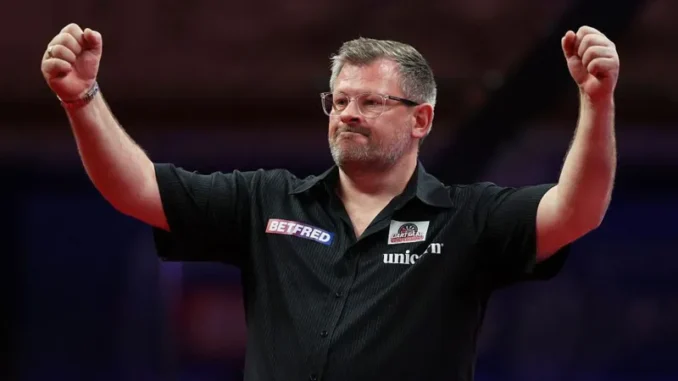
In the high-octane world of professional darts, where precision and mental fortitude are as critical as a steady hand, James Wade has long been a towering figure. Known as “The Machine” for his methodical approach and relentless consistency, the 42-year-old darts star from Surrey has faced battles far beyond the oche. Recently, Wade opened up about a pivotal moment in his life: his diagnosis with bipolar disorder and attention deficit hyperactivity disorder (ADHD) at the age of 27. Far from being a burden, he described this revelation as a profound relief, a turning point that brought clarity to years of internal struggles and set him on a path toward self-understanding and resilience.
Wade’s journey to this diagnosis was not straightforward. Growing up, he grappled with intense mood swings and challenges with focus, which he initially chalked up to the pressures of competitive sports or personal shortcomings. The world of darts, with its demanding schedule and relentless scrutiny, only amplified these struggles. Yet, it was in his late twenties, at the height of his career, that Wade sought answers. “It was a relief to be diagnosed with bipolar,” he shared, reflecting on the moment he received the news. “It explained so much about what I’d been through, the highs and lows that didn’t always make sense.” This diagnosis, coupled with ADHD, provided a framework for understanding the emotional turbulence that had shadowed him for years, offering not just an explanation but a roadmap for managing his mental health.
The diagnosis came at a time when Wade was already a prominent figure in darts, having secured multiple titles, including the 2007 World Matchplay and the 2009 Premier League. Yet, behind the trophies and the spotlight, he was navigating a private battle. Bipolar disorder, characterized by extreme mood swings ranging from manic highs to depressive lows, can be particularly challenging in a sport that demands unwavering focus. ADHD, with its impact on attention and impulse control, added another layer of complexity. Wade’s openness about these conditions sheds light on the often-unseen struggles of athletes, who are expected to perform flawlessly under pressure. “Getting that diagnosis was like someone handing me a manual for my own mind,” he said. “It didn’t fix everything, but it gave me a way to start working with it, not against it.”
Since his diagnosis, Wade has been proactive in managing his mental health, working with professionals to develop strategies that allow him to compete at the highest level. Medication, therapy, and a strong support system have been integral to his journey. He credits his family, particularly his wife, Sammi, for providing unwavering support. “Having people around you who understand what you’re going through makes a massive difference,” he noted. “It’s not just about the darts; it’s about living a life where you can feel stable.” Wade’s approach is pragmatic, emphasizing routine and self-awareness to navigate the challenges of his conditions while continuing to compete in a sport he loves.
His story also highlights the evolving conversation around mental health in sports. Darts, often seen as a working-class game played in pubs and clubs, has not always been a space where mental health discussions flourished. Wade’s candor is helping to change that, encouraging others to seek help without stigma. “If I can talk about it, maybe someone else will feel like they can too,” he said, underscoring his hope to inspire others. His openness comes at a time when the darts community is witnessing a surge of young talent, adding pressure to veterans like Wade to stay competitive. Yet, his resilience in the face of personal and professional challenges serves as a powerful example of perseverance.
Wade’s career, spanning over two decades, includes 11 major titles and a reputation as one of the sport’s most consistent performers. Even now, at 42, he remains a formidable presence on the PDC tour, competing against players half his age, like teenage sensation Luke Littler. His ability to maintain elite performance while managing bipolar disorder and ADHD is a testament to his strength and adaptability. “You’ve got to keep going, keep adapting,” he said. “The game’s getting younger, faster, but I’m still here, and I’m still fighting.” His recent performances, including strong showings in the World Matchplay and Players Championship events, demonstrate that he’s far from finished.
Beyond the dartboard, Wade is also an advocate for mental health awareness, using his platform to encourage open dialogue. He’s spoken about the importance of recognizing warning signs and seeking help early, particularly for young athletes who may face similar struggles. “It’s not a weakness to ask for help—it’s the strongest thing you can do,” he emphasized. His story resonates beyond darts, touching anyone who has faced the uncertainty of mental health challenges and found solace in understanding their condition.
As Wade continues to compete, his diagnosis remains a cornerstone of his journey, not a limitation. It has given him the tools to navigate life’s highs and lows with greater clarity, allowing him to focus on what he does best: throwing darts with pinpoint accuracy. His relief at being diagnosed reflects a universal truth—sometimes, understanding the problem is the first step toward mastering it. For James Wade, that understanding has not only kept him in the game but has also made him a beacon of hope for others, proving that even in the face of invisible battles, triumph is possible.
Leave a Reply